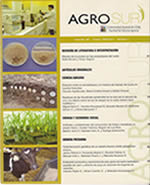Development and evaluation of a corn (Zea mays L.) seeding unit for animal or human traction
Main Article Content
Abstract
Mechanization is generally difficult for small farmers since it is either not accessible due to cost or it does not adapt to their necessities. Much effort has gone into the design and construction of equipment for small surfaces, which is to be welcomed only if it provides a functional and economic solution to the specific problem of the farmer. Under that approach, the objective of this study was to design, build and evaluate a low-cost horse drawn seeder, eventually human, using materials that are easy to acquire.
A prototype was designed and built using parts and components made of iron plates, wood, bicycle pinions and chains with promising results in both static and dynamic tests, using a disk of 16 holes that locates 6.8 seeds per meter with a coefficient of variation of 4.5% with respect to the expected value, with 85.4% of the seeds well placed, without loss by damage to the seeds. Additionally, a seeding depth of 4.72 cm was achieved, against an expected depth of 5 cm.

